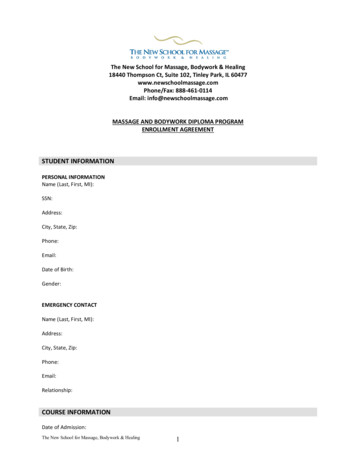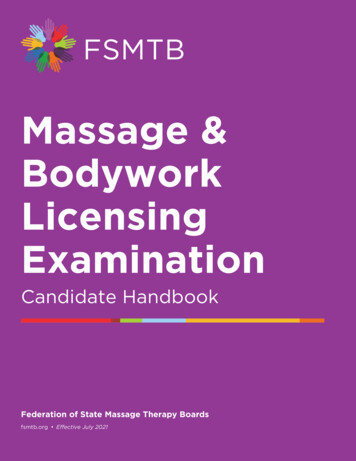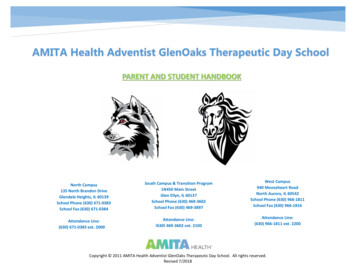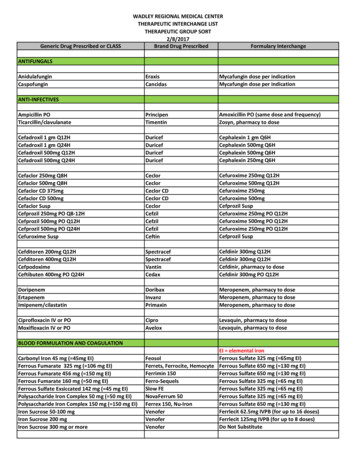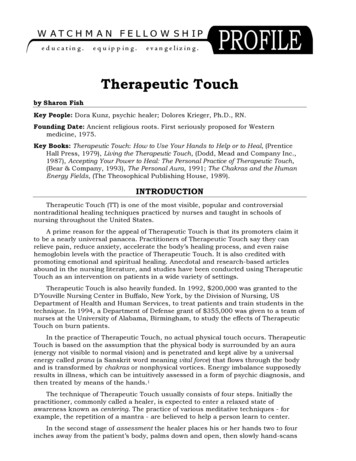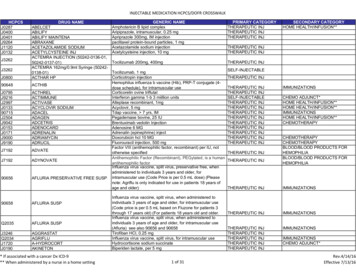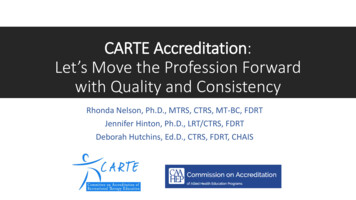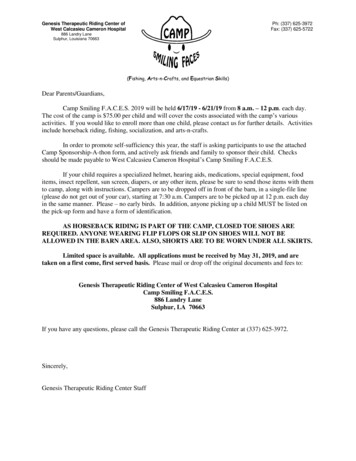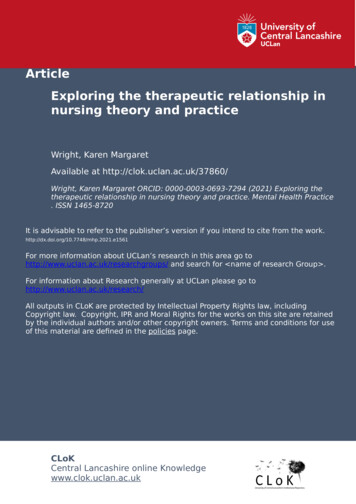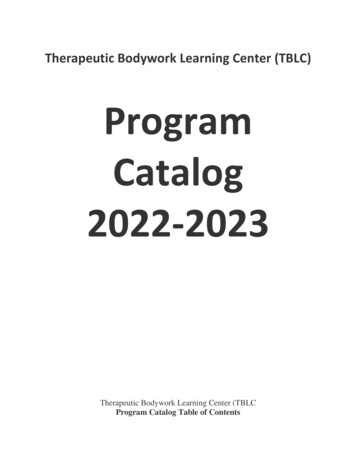
Transcription
Therapeutic Bodywork Learning Center (TBLC)ProgramCatalog2022-2023Therapeutic Bodywork Learning Center (TBLCProgram Catalog Table of Contents
2Page 3General Overview and DescriptionThe facilityVisionMissionPage 4Financial AidYour career as a Massage TherapistEducational Requirements for Maine State LicensureThe Faculty of the SchoolPage 5Program OverviewGradingHoursPage 6-10 500-hour Program CurriculumPage 11-14 Overview of TBLC Policies (see also TBLC Policy Manual)Page 14Application and enrollment ProcessGeneral Overview and DescriptionTBLC is a small, private school in Brewer Maine. TBLC administers one program only, a 500hour, state approved and licensed Massage Therapy Training Program.TBLC Program Catalog 050122Licensed by the Maine Department of EducationApproved for the use of GI Bill benefits
3The FacilityOur facility is located on 141 North Main Street, Suite 306, Brewer, Maine. The 800 square footroom has been inspected by the Department of Maine Education, Department of Health, and theBrewer Fire Department. Bathrooms are conveniently located and wi-fi is availableVisionTo provide Maine communities with skilled, caring, and compassionate massage therapists tomeet the needs of individuals in an ever-changing world.Mission StatementAt the Therapeutic Bodywork Learning Center (TBLC), students gain the knowledge, skills, andconfidence they need to become exceptional and successful massage therapists. Throughcomprehensive curriculum students learn how to combine expert technique with caring presence.TBLC’s intention is to create an affordable avenue of study and licensure qualification throughsmall hands-on classes and clinical experience. Our goal is to provide a twice a month, weekendmassage training program that allows flexibility to continue with job, caregiving, etc. Upongraduation, students have a solid foundation and tools to develop a successful massage practice.Our instructors are dedicated to bringing forth a quality, apprenticeship-like, educationalexperience for the student, utilizing our own expertise as massage therapists. All our teachershave active bodywork practices.Self- care techniques are an integral part of our entire training program.The TBLC experience supports you in connecting with a community of like-minded peopleinterested in learning natural healing techniques. Learn an integrated approach to therapeuticmassage that encourages the body / mind / spirit connection.Financial AidAs a small private school TBLC does not quality for large state and federal financial aid andgrant programs. Small state scholarships and grants may be available (check jobsforme.com).Some veterans may be eligible for tuition reimbursement through the GI benefits. GI Bill ” is aregistered trademark of the U.S. Department of Veterans Affairs (VA). More information about education benefitsTBLC Program Catalog 050122Licensed by the Maine Department of EducationApproved for the use of GI Bill benefits
4offered by VA is available at the official U.S. government website www.benefits.va.gov/gibill.comYour Career as a Massage TherapistMassage Therapy has been a traditional form of health care used throughout time in virtuallyevery culture. The ever-growing popularity of complementary health care has created the perfectopportunity for those entering the massage therapy field to have both an emotionally fulfillingand financially rewarding career. Careers working in retirement facilities, spas, hospitals, beautysalons, chiropractor and medical doctor's offices can be open to the licensed massage therapist.Many enjoy the option of setting up their own practices.Educational Requirements for Maine State LicensureAccording to Title 32, section 14306-D of the State of Maine a person may not claim to be amassage therapist unless licensed in accordance with this chapter. Currently, Maine's educationalrequirements needed to apply for licensure are to demonstrate completion of a course of trainingconsisting of 500 hours or more approved by the state; or pass the Federation of State MassageTherapy Boards (MBLEx) state licensing entrance exam.Students completing and passing the Therapeutic Bodywork Learning Center’s 500 HR. MassageTherapy Training Program in its entirety are eligible to apply for Maine Massage Licensure; andmay sit for the MBLEx exam.For more information contact:Dept. of Professional and Financial Regulation, Office of Licensing and Registration,35 State House Station, Augusta, Maine, 04333-0035. PHONE: (207.624.8613)WEBSITE: s/massageThe Faculty of the SchoolThe small faculty is comprised of the owner and operator of the school, Suzanne Philp and oneother primary teacher, Donna Kraft-Smith, the founder of the school. Suzanne and Donna teachmost of the curriculum. Cheryl Willis teaches short segments of Pathology and Kinesiologythroughout the program year. Outside instructors are brought in to teach specialty subjects suchas Reiki and Seated/Chair Massage to provide variety to the student experience. All teachers andinstructors are working Licensed Massage Therapists with successful practices in theircommunities. Each is committed to continuing education to ensure that concepts and techniquestaught are up to date and accurate. See also Teacher Bios.The 500 Hr. Massage Therapy Training ProgramOverviewTBLC Program Catalog 050122Licensed by the Maine Department of EducationApproved for the use of GI Bill benefits
5The Therapeutic Bodywork Learning Center (TBLC) offers 500 hours of supervised trainingwith 100 hours of hands-on practice completed and documented by the student outside of class.The school follows specific Department of Maine Education and National Certification Board ofTherapeutic Massage & Bodywork (NCBTMB) requirements. This is a 13–14-month programwith classes usually offered through twice monthly weekend intensives. Classes are small with amaximum of 12 students. Instructors record your attendance and evaluate your performance inapplying theory with technique.Students completing and passing TBLC’s 500-hour Massage Therapy Training Program in itsentirety are eligible to apply for their Maine State Massage License and sit for the MBLEX exam(the licensing examination of the Federation of State Massage Therapy Boards www.fsmtb.org)if desired.GradingAll students are given practical evaluations as well as written or on-line tests. A grade is givenbased on the ability to understand and apply the theory and techniques taught. Students mustmaintain a grade of 70% or above to pass. Remote learning is available should a student beunable to come to a class on an as needed basis.HoursTypically, classes are held two weekends a month (see also School Calendar) from Septemberthrough October of the following year. Arrangements are made for hours missed due toinclement weather and other unforeseen circumstances. Each class day begins at 8am and endsat 6:30pm on Saturday and Sunday of each school weekend.Sample Daily Class Routine8 am to 9 am - Centering/Body mechanics/Stretching9 am to 11 am – Anatomy, Physiology, Pathology, Academics, Theory11:00 am to 1 pm – Kinesiology, Muscle Learning, Palpation, Demo and Practice1 pm to 2 pm - Lunch2 pm to 4 pm - Technique, Muscle Learning, Palpation, Demo and Practice4:00 pm to 6:30 pm - Practice lab, massage practice and trades*Students are required to bring their own lotions, linens & massage tables.*Academic hours are based on sixty-minute instructional segments with ample short breaks.500-hour Program CurriculumI. Anatomy & Physiology (95 hours)Students will learn general knowledge of the body systems. Classes will be taught throughTBLC Program Catalog 050122Licensed by the Maine Department of EducationApproved for the use of GI Bill benefits
6lecture, video, in-class research and hands-on assignments.A. General knowledge of the form and function of the following body systems and how thesesystems may be impacted by the administration of massage and bodywork:1. Basic Chemistry, Cells, and Tissues2. The Skeletal System3. The Muscular System4. The Nervous System5. The Endocrine System6. The Urinary/Excretory System7. The Reproductive System8. The Integumentary System9. The Cardiovascular System10. The Lymphatic System11. The Respiratory System12. The Digestive SystemB. Anatomical positions, Body Cavities, Regions of the Body, Planes of the BodyC. Anatomical TerminologyD. Basic nutrition principlesII. Kinesiology (30 hours)Students will learn bones, muscle groups, individual muscles, joints, joint movements andstructures and tissues of the body and their functions through palpation, sculpture, drawing,applying felt muscles to full size skeleton, taping and other hands-on activities and games.Bones and joints are covered repeatedly throughout the program. Each muscle group iscovered in detail twiceA. BonesB. Joints1. Joint Types2. Joint Movement3. Joint structure, form and functionC. Muscles1. Muscle groupsa. Lower leg and footb. Pelvis and Thighc. Spine and Thoraxd. Shoulder and Arme. Forearm and Handf. Head/Neck and Face2. Muscle attachments3. Muscle shapes and fiber directions4. Types of muscle contraction5. Muscle movements/actionsa. Prime MoversTBLC Program Catalog 050122Licensed by the Maine Department of EducationApproved for the use of GI Bill benefits
7b. Synergistsc. AntagonistsD. Connective Tissues1. Tendons2. Fascia3. Ligaments4. BursaeE. Proprioception/ProprioceptorsIII. Pathology (40 hours)Students will learn general knowledge of how disease affects each body system. Classes willbe taught through lecture, video and in-class research projects.A.B.C.D.E.F.Medical terminology / Basic pharmacologySigns and symptoms of a diseaseModes of contagious disease transmission (e.g. blood, saliva)Effects of psychological and emotional states (e.g. depression, anxiety, grief, trauma)Indications for massage therapyContraindications (cautions) for massage therapy1. Caution vs. complete contraindication2. Local contraindication vs. complete contraindication3. Assessment proceduresG. Principles of Injury Care1. Acute conditions2. Chronic conditionsH. Life stages and massage (child, adolescent, adult, pregnancy, senior/elder)1. Indications for massage2. Contraindications for massageI. Interviewing skills1. The health intake assessment2. Documenting conditions, concerns and contraindications3. When to refer to a medical professional4. The Massage Therapists Scope of Practicea. What we can and can’t do as LMTsIV. Therapeutic Massage & Bodywork Applications (Total: 300 hours)Students learn to create an integrative approach to creating both a relaxing andtherapeutic bodywork session utilizing the theory and hands-on approaches of themodalities mentioned below. Throughout the entire training the student is taught how toTBLC Program Catalog 050122Licensed by the Maine Department of EducationApproved for the use of GI Bill benefits
8utilize their own body wisely, Body Mechanics, while performing sessions. Material istaught through lecture, demo, hands on practice, instructional and practical applications.A. Swedish Massage (100 of 300 hours): A study of basic Swedish massage including: theory,techniques (stokes, order of strokes, depth and speed of strokes), how to create a relaxing flow,proper draping of clients, assessing clients’ needs and expectations, and appropriate interactionbetween practitioner and client. Supervised public clinicals are included.B. Deep Tissue Techniques (65 of 300 hours): Specific techniques identifying underlyingmusculature, etc. such as cross – fiber friction, stretching, releasing trigger points,postural assessment, etc. Working with injuries is included.1. Intro to Postural Assessment (10 of 65 hours): More skills in accessing and balancingclients stress by observing their posture and gait patterns. Information can be used todetermine more appropriate treatment of musculature.2. Sports Massage (5 of 65 hours): The focus is to help with pre-event and post- eventactivities on athletes.3. Muscle specific techniques (50 of 65 hours)C. Intro to Infant /Pregnancy/Postpartum/ Geriatric Massage (25 of 300 hours):The student gains an understanding of benefits, caution, contraindications and how toapply technique, proper positioning and pressure in each situation. Supervised publicclinicals are includedD. Hydro/Cryo Therapy (25 of 300 hours): Instruction on the local effects of heat and coldapplications for the rehabilitation of muscle tissue.1. Aromatherapy (8 of 25 hours): The safe utilization of essential oils for topicallubrications, disinfectant sprays, etc.2. Hot Stone Massage (12 of 25 hours): Creating a spa –like experience utilizing hotstones safely for massage in a dry room (no sink).3. Therapeutic Spa Facial Massage (5 of 25 hours): How to create a spa-likeexperience in a dry room. This includes knowledge of skin conditions andpathologies,E. Seated Massage / Chair Techniques (13 of 300 hours): Focus on seated massagetechniques easily used in the executive office, employee work setting or for those clientswho simply cannot lie down. Use of specialized massage chairs and equipment will beexplored. Supervised public clinicals are included.F. Intro to Lymph Massage (7 of 300 hours): Focus on learning about the lymph nodeswith specialized compression techniques indicated for manually moving fluid andreducing inflammation and edema.TBLC Program Catalog 050122Licensed by the Maine Department of EducationApproved for the use of GI Bill benefits
9G. Energetic Massage (65 of 300 hours) A study of light touch and off the body energyhealing that can be integrated into a Therapeutic Massage or use as its own modality.Learning to sense the Life Force (e.g.: Chi, Prana, etc.) as it moves through the body1. Intro to Foot Reflexology (30 of 65 hours): Basic intro to Ingram Foot ReflexologyTheory and how to access and treat body energy through specific points on the feet.2. Reiki I II Certification (20 of 65 hours): Usui/ Tibetan healing practices utilizingmeditation, assessment, symbols, attunement and distance healing techniques.3. Intro to Asian Acupressure (15 of 65 hours): Basic intro to Chinese Yin / Yang andelemental theory, and general knowledge of meridians and points. Focus is to givepractitioner more skills in assessing and treating clients.V. Professional Standards, Ethics, Business & Legal practices (35 hours)Students will learn general knowledge of how to create and maintain the business side of amassage practice. Classes will be taught through lecture and research projects.A. Ethics and Boundaries (10 of 35 hours)B. Professional, Business and Legal Practices (25 of 35 hours)1. Scope and Standards of practice2. Client interviewing techniques3. Referring clients/ Communication with other health care professionals4. Verbal and nonverbal communication skills5. Confidentiality5. Record keeping6. Basic business & accounting practices7. Regulations pertaining to Federal Income taxes8. State and local credential requirements9. Legal entities10. Liability insurance11. Marketing Strategies12. Market Research13. Electronic optionsIncluded in Hands-On Training Hours:* Body Mechanics: Self-assessment and specific skills for the therapist to determine how touseTBLC Program Catalog 050122Licensed by the Maine Department of EducationApproved for the use of GI Bill benefits
10their own body safely while performing bodywork sessions. Techniques include conceptsfromYoga and Tai Chi. This study contributes to therapist injury prevention and better clientpostural assessment skills as well.* Two private tutorials provided to each student: Private time with a teacher will beprovided for about an hour and a half in each tutorial. The student practices hands-ontechniques with the teacher as the client. This is a time for the student to work completely attheir own pace, refining and learning new techniques and asking specific questions abouttheory and techniques, body mechanics and flow.* Supervised Public Massage/ Bodywork Clinics: Throughout the year TBLC students gettopractice on the public. TBLC offers our services to pregnant moms, retreats, festivals, localgroups and businesses through scheduled supervised on-site and off- site clinical experiences.Schedule of Tuition and FeesTuition for 2022-2023: 6000.00 (Installment plans are available at no extra cost)Application Fee: 25.00 Due with the application formEnrollment Fee: 100.00 Due with the enrollment form/contractBook deposit: 200.00 Due July 1, 2022Tuition deposit: 200.00 Due July 1, 2022 (goes toward last tuition payment)Lending Library Fee: 50.00 (optional)Supplies to be purchased by the student prior to the first day of class: (cost will vary)Massage table (capable of supporting up to 400lbs or working weight)Sheets (2 twin size sets or custom massage table sets)BlanketWashable apron with pocketsLotion holster (optional)Pens, pencils, notebooks for taking notes in classMarkers or colored pencilsWashable or disposable masks/face coveringsStudent Liability Insurance through AMTA (arranged with the Director of TBLC)Overview of TBLC PoliciesTBLC Program Catalog 050122Licensed by the Maine Department of EducationApproved for the use of GI Bill benefits
11Enrollment / Graduation Requirements:All who wish to enroll in this program must:1. Be 18 years of age or older.2. Show proof of a high school diploma or G.E.D., or college diploma.3. Be in good physical health, capable of effectively meeting the physical demands of performingtherapeutic massage.4. Have a personal interview. At this time, the prospective student will receive a tour and a completeexplanation of the program and may receive an enrollment agreement.5. Be teachable and willing to accept Therapeutic Bodywork Learning Center’s(TBLC) policies and procedures and assistance, if necessary, during enrollment andthroughout the course.6. Acquire a “70” or above average grade for passing.7. Provide documentation of a current CPR/ First Aid course before graduating.8. Provide documentation of two professional massages before graduation.9. Provide documentation of performing 100 practice sessions before graduation.Non - Discrimination PolicyThe Therapeutic Bodywork Learning Center (TBLC) accepts students based upon their desire to learn andachieve. TBLC does not discriminate with regard to age, sexual orientation, marital status, race, color,national origin, religion, sex or disability (unless such a disability is determined by a medical authority toqualify the potential student as unfit for the program).See also: TBLC Policy Manual for detailed policiesTRANSFER OF CREDIT POLICIES:Transfer of credits to the Therapeutic Bodywork Learning Center is considered on an individual basis.Courses must be in-line with TBLC curriculum and from an accredited college or massage school withinthe last 5 years from the TBLC application.For those students who must put their TBLC massage training on hold:The school maintains a written record of the previous education and training from TBLC and grants creditappropriately, with the training period shortened proportionately.TBLC makes no guarantee of credit transfer from our school to any other institution.ATTENDANCE / MAKE-UP POLICIESIn most cases we will be meeting for two, ten hour class days, usually two weekends per month until therequired hours for this program are met. Attendance and promptness are essential in such an intensiveprogram. Policies mentioned here are in accordance with the requirements of massage instruction setforth by the National Certification Board in Therapeutic Massage and Bodywork (NCBTMB) and theMaine Department of Education. Failure to maintain satisfactory attendance can result in the student notacquiring their needed hands-on training. Attendance is taken at the beginning of each class. Those who are not present will be markedAbsent.If a student is more than 15 minutes late for a class hour this will be counted as a Tardy. Allabsences must be made-up.Students who leave at class break and do not return will be marked absent for those hours.TBLC Program Catalog 050122Licensed by the Maine Department of EducationApproved for the use of GI Bill benefits
12 Students are required to call TBLC to inform the school of their absences. Students must callwhen not able to attend classes. A “no call - no show” is unacceptable and this strongly reflectson your level of professionalism. More than one “no call, no- show” can be grounds forprobation.Remote Learning may be an option if a student is unable to attend class due to inclement weatherin their area or sickness in their household. Remote learning applies to academic portions of theclass only. Hands on credit cannot be given for remote learning.Make-Up Policy:Students are required to attend 100% of the program. Teachers will work with students to make up missed hours as needed up to a reasonable amountof hours.Make - up fees of 40 per hour will be charged to each student in addition to their normaltuition fees. Students may split make up session costs among groups of students.For those students who must put their TBLC massage training on hold: The school maintains a written record of the previous education and training from TBLC andgrants credit appropriately, with the training period shortened proportionatelyStudent Conduct / Hygiene Policy:Students are expected to maintain the highest standards of personal conduct and hygiene both in class andwhen working with clients.This includes: no infectious conditions that are unsuitable to perform massage clean and appropriate attire, consisting of casual outfits modest in appearance clean hair, body and short fingernails no perfumes or strong scents (including essential oils) clean linens for class training no smoking, alcohol or drugs near or in the school building. not interfering with other students learning by being loud and obscene. bringing the appropriate supplies to class (e.g.: lotions, linens, massage table, books).Probation / DismissalA student may be placed on probation for any of the following reasons: failure to maintain attendance policies failure to meet tuition payments failure to meet Student Conduct/ Hygiene policies.Any student whose practical evaluation grade falls below "70” will be placed on Probation. Help will beoffered to ensure the students success. Students will only be allowed one period of probation.If the student fails to bring their grade level up to a "70” or above within a three month period theybecome subject to Dismissal. Dismissal requires that a student withdraw from the program and may notreapply until the beginning of the next session of the training program.TBLC Program Catalog 050122Licensed by the Maine Department of EducationApproved for the use of GI Bill benefits
13The Therapeutic Bodywork Learning Center (TBLC) reserves the right to dismiss a student if the studentfails to: complete her/his probationary requirements fails to meet tuition payments fails to comply with the Student Conduct/Hygiene policy.The dismissed student will receive a tuition refund, calculated according to any fraction of the programpaid for but not completed (at the time of dismissal) minus the application, deposit, enrollment and bookfees.Rescheduling Intensives PolicyTBLC reserves the right to reschedule intensives in whole or in part due to instructor sickness, poordriving/weather conditions, or lack of class attendance. Students are required to call when unable tocome to class. When weather is a concern students can call. When class is rescheduled last minute,students will be notified by phone or text of no class.Student ComplaintsStudents enrolled in any portion of the Therapeutic Bodywork Learning Center’s (TBLC) trainingprogram which have a grievance or concern should direct them personally or in writing to theowner/director, Suzanne Philp, LMT to find a resolution.Termination / Dismissal Refund PolicyProspective students who withdraw their applications are not entitled to any application fee refund.Upon enrolling in the Therapeutic Bodywork Learning Center (TBLC) the student and TBLC enter into acontractual agreement entitled an Enrollment Agreement. This Agreement is a mutually protective andlegally binding document between us and assures the conditions and all policies listed throughout thiscatalog, including the following policies on refunds listed below. A 100 Enrollment Fee mustaccompany the Enrollment Agreement to hold your place in class is due.* Student Termination of Program Refund: In a case where the student voluntarily withdraws from the program within 3 days of signing theEnrollment Agreement, a full refund of the enrollment fee and any monies applied towardstuition, not including book fees or the application fee will be given. If the student should withdraw from the program after the 3 day period in which the EnrollmentAgreement was signed, a tuition refund will be calculated and given according to any fraction ofthe program paid for but not completed minus the application, enrollment and book fees.Note for GI Bill recipients only: In accordance with the requirements of 38 USC 3676, TBLC will alsorefund any amount in excess of 10.00 for an application fee and any enrollment fees will also beprorated.” ). More information about education benefits offered by VA is available at the official U.S.government website at www.benefits.va.gov/gibill* Dismissed Student Refunds:The dismissed student will receive a tuition refund within 30 days of the effective date, calculatedaccording to any fraction of the program paid for but not completed at the time of dismissal, minus theapplication, enrollment, deposit, book fees and any tuition fees for attended classes.TBLC Program Catalog 050122Licensed by the Maine Department of EducationApproved for the use of GI Bill benefits
14* Termination of Program: In such an event that TBLC is unable to teach any or part of the training programs due tounforeseen circumstances, students are entitled to transfer their credit hours to be used by anothertraining program. A tuition refund will be calculated and given according to any fraction of theprogram paid for but not completed. In such an event that the student does not wish this transfer or use of these credit hours in anyway, the student is entitled to a refund of only those tuition and application fees actually paid andwill receive no credit or records.* The 50 Lending Library fee if utilized, will be refunded at the end of the program if all books, theMannikin, video and tapes, etc. are returned and are in the same condition as when borrowed, and if thetuition balance is paid in full.Refunds will be made 30 days of the effective date .NOTE: Local laws, state laws & GI recipient requirementscan vary regarding massage training requirements.For specific information refer to your state and local authorities.The Application and Enrollment Process: Step by Step1.2.3.4.5.Complete and submit your application, including your essay and 25 fee.Receive confirmation of application from the Director.Schedule a time to visit and observe at TBLC and have an interview with the Director.Ask any questions you have to help you decide if TBLC is the right program for you.If you want to be enrolled in the upcoming class complete and submit your enrollment form/contractincluding the 100.00 fee. Once your enrollment is accepted and signed by the Director your place inthe upcoming class is secured.6. Receive confirmations of your enrollment from the Director.7. Apply for state scholarships as needed.8. Pay book deposit and tuition deposit by July 1st prior to the start of your program.9. Participate in discussions with the director and future classmates regarding ordering of text books.10. Secure needed supplies (massage table, sheets, apron etc.)11. Mark your calendar with class dates for your program.120221.spTBLC Program Catalog 050122Licensed by the Maine Department of EducationApproved for the use of GI Bill benefits
The Faculty of the School Page 5 Program Overview Grading Hours Page 6-10 500-hour Program Curriculum . Therapeutic Massage & Bodywork (NCBTMB) requirements. This is a 13-14-month program with classes usually offered through twice monthly weekend intensives. Classes are small with a
